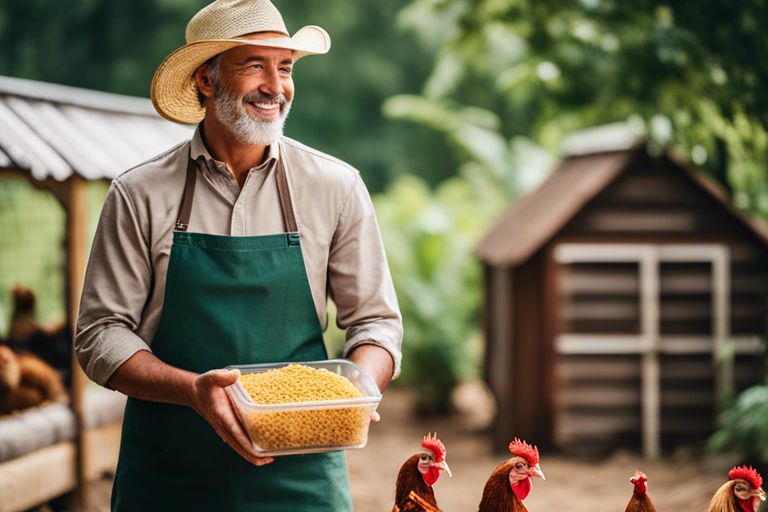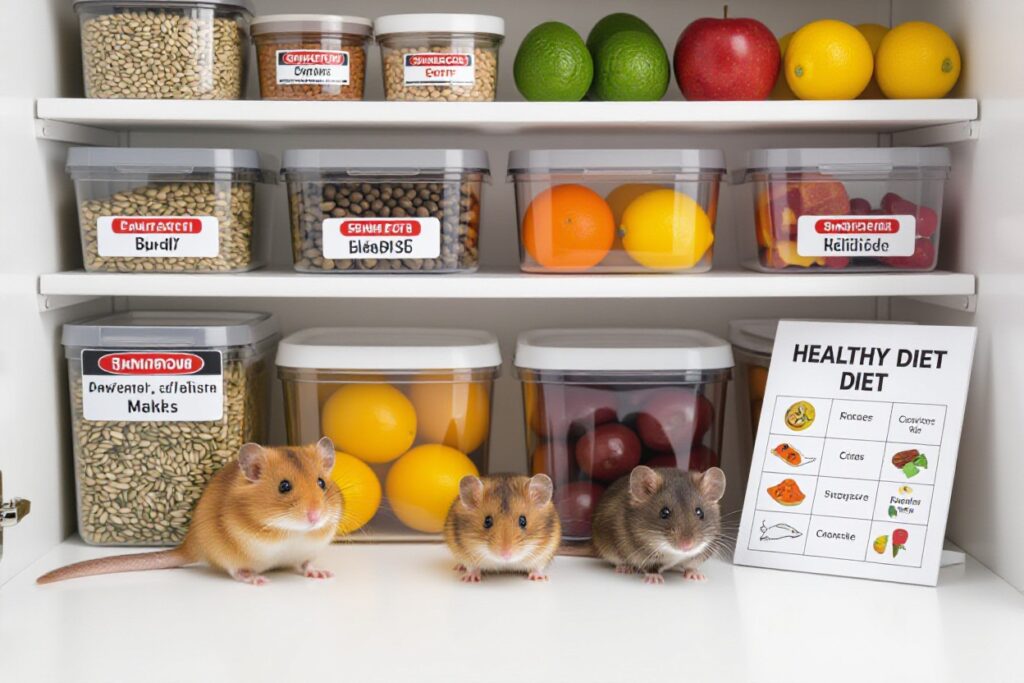With the increasing interest in sustainable living and backyard farming, raising chickens has become a popular endeavor for many. Ensuring the health and well-being of your feathered friends is important for their happiness and productivity. In this article, we will share 10 important tips to help you raise healthy chickens with confidence and success.

Provide Balanced Diet
Nutritional feed
A balanced diet is crucial for the health and productivity of your chickens. Little known fact – chickens require a diet that is high in protein to support their growth, egg production, and overall health. Make sure to provide them with a quality feed that is specifically formulated for their needs, and consider supplementing with treats like mealworms or kitchen scraps to add variety to their diet.
Fresh greens
Fresh greens are an necessary part of a chicken’s diet, as they provide important vitamins and nutrients that may be lacking in their regular feed. Plus, chickens love the taste of greens like spinach, kale, and lettuce, making it an enjoyable addition to their diet. Consider planting a small garden or setting aside a patch of grass for your chickens to forage in, or simply offer them fresh greens as treats to keep them healthy and happy.
Fresh Water Access
Clean containers
You know the importance of providing fresh water to your chickens, but it’s equally important to ensure that the containers you use are clean. Dirty water containers can harbor harmful bacteria and algae, which can make your chickens sick. Make sure to clean and refill water containers regularly to keep your flock healthy and hydrated.
Daily refills
Some chicken owners make the mistake of assuming that refilling water containers every few days is sufficient. However, chickens can go through water quickly, especially during hot weather or if they are laying eggs. It’s best practice to refill water containers daily to ensure that your chickens always have access to clean, fresh water.
By providing clean containers and refilling them daily, you can ensure that your chickens have constant access to fresh water, which is necessary for their health and well-being. Remember to monitor water consumption to gauge how much your flock is drinking and adjust accordingly. With these simple steps, you can keep your chickens happy and healthy.

Safe Housing
Predator-proof coop
If you want to ensure the safety of your chickens, building a predator-proof coop is necessary. Predators such as raccoons, foxes, and even neighborhood dogs can pose a threat to your flock. Make sure that your coop is secure from all sides, including the floor, to prevent digging. Use sturdy locks and materials that predators cannot easily break into to keep your chickens safe from harm.
Ventilation and insulation
Little attention to ventilation and insulation can lead to serious health issues for your chickens. Proper airflow is crucial to prevent the buildup of harmful gases like ammonia and keep the coop dry. Insulation helps regulate temperature, keeping your chickens warm in the winter and cool in the summer. Consider using windows with wire mesh for adequate ventilation while still protecting your flock from drafts.
The key to a healthy chicken coop is finding the perfect balance between ventilation and insulation. Proper air circulation prevents respiratory issues, while insulation helps maintain a comfortable environment for your chickens. Check your coop regularly to ensure that airflow is optimal and that insulation is in good condition to keep your feathered friends happy and healthy.

Keep Coop Clean
Regular cleaning
Now, one of the important tips for raising healthy chickens is to keep their coop clean. Regular cleaning is crucial for maintaining a healthy living environment for your feathered friends. Make it a habit to remove soiled bedding, droppings, and any leftover feed daily. This will help prevent the buildup of bacteria and parasites, keeping your chickens happy and healthy.
Disinfect quarters
An important aspect of keeping your chickens healthy is to disinfect their living quarters regularly. An effective way to do this is by using a poultry-safe disinfectant. This will help eliminate harmful bacteria and germs that can cause diseases in your flock. Make sure to follow the instructions on the disinfectant label and pay special attention to areas where bacteria tend to thrive, such as feeders, waterers, and roosting bars.
Coop hygiene is key to preventing the spread of diseases and ensuring the well-being of your chickens. By regularly cleaning and disinfecting their living quarters, you are taking proactive steps to keep your flock healthy and happy. Note, a clean coop is a happy coop!
Routine Health Checks
Observe behavior
For routine health checks on your chickens, observing their behavior is key. Little changes in behavior can often indicate underlying health issues. Keep an eye out for changes in eating or drinking habits, lethargy, unusual vocalizations, or changes in social interactions within the flock. Any significant shifts in behavior should prompt a closer examination of your chickens’ health.
Check for parasites
To ensure your chickens are in optimal health, regularly check for parasites. Parasites such as mites, lice, fleas, and worms can negatively impact the well-being of your flock. Inspect your chickens regularly for signs of parasites, such as feather loss, irritated skin, or worms in their droppings. If you suspect a parasitic infestation, consult with your veterinarian for appropriate treatment options.
Parasites can quickly spread among your flock if left unchecked, leading to decreased egg production, poor growth, and even mortality. Implementing a regular parasite prevention program and promptly treating any infestations are crucial aspects of maintaining your chickens’ health.
Vaccinate Timely
Many poultry owners underestimate the importance of timely vaccination for their chickens. Vaccination plays a crucial role in preventing various diseases that can affect the health of your flock. By following a proper vaccination schedule, you can protect your chickens from potentially deadly illnesses and ensure they lead a healthy life.
Follow schedule
Vaccinate your chickens according to a set schedule recommended by poultry health professionals. Various vaccines are available to protect against common diseases like Newcastle disease, infectious bronchitis, and Marek’s disease. Each vaccine has a specific timing and method of administration that should be strictly followed to ensure maximum effectiveness.
Disease prevention
To prevent diseases in your flock, apart from vaccination, ensure your chickens have a clean and well-maintained living environment. Proper sanitation practices, regular cleaning of coops, and providing clean water and nutritious feed are imperative for disease prevention. Additionally, limit exposure to wild birds and animals that may carry diseases that can infect your chickens.
Following a strict vaccination schedule and implementing proactive disease prevention measures are key strategies in maintaining a healthy flock of chickens. By being diligent and proactive in these aspects, you can safeguard the well-being of your chickens and prevent the spread of diseases on your poultry farm.
Limit Stressors
Maintain routines
To ensure your chickens are stress-free, it is crucial to maintain consistent routines. Chickens thrive on predictability, so make sure to feed them at the same times each day, collect eggs regularly, and let them out in the morning and secure them in their coop at night. Sudden changes in their schedule can lead to stress, impacting their health and egg production.
Gentle handling
Even though chickens may not seem as cuddly as other pets, they still benefit greatly from gentle handling. When picking up your chickens, approach them calmly and avoid any sudden movements. Support their bodies properly and never grab them forcefully. Gentle handling helps to build trust between you and your feathered friends, making them feel more secure and less stressed.
This careful approach is particularly important with new or young chickens who are not yet accustomed to human interaction. Spend time sitting with them in the coop or run, offering treats to encourage them to come closer and associate your presence with positive experiences. Over time, they will become more comfortable with being handled, making health checks and bonding moments much easier.
Proper Space Allocation
Room to roam
Not providing enough space for your chickens to roam can lead to various health issues and behavioral problems. Chickens need room to exercise, peck at the ground, and spread their wings. Make sure to allocate at least 4 square feet of space per chicken in the coop to ensure they have enough room to move around comfortably.
Avoid crowding
Some novice chicken owners make the mistake of crowding too many chickens into a small space. This can lead to stress, aggression, and the spread of diseases among the flock. To avoid crowding, be mindful of the number of chickens you have and the size of your coop. Overcrowding can also impact egg production and overall chicken health.
Space is crucial for the well-being of your chickens. In addition to providing enough space in the coop, ensure that there is ample space in the outdoor run as well. A crowded living environment can lead to pecking behavior, which can result in injuries and even death among the flock. Prioritize space allocation to prevent these issues and maintain a healthy chicken environment.
Social Integration
Once again, when raising chickens, social integration is a crucial aspect that should not be overlooked. Chickens are naturally social animals that thrive in a flock setting. Ensuring proper social integration will lead to healthier and happier chickens.
When introducing new chickens to an existing flock, it is important to do so gradually. Chickens establish a pecking order within the flock, and introducing new members can disrupt this hierarchy. To minimize potential conflicts, introduce new chickens during the evening when the existing flock is more relaxed.
Monitor the flock closely after introducing new members to ensure that there is no excessive pecking or bullying. It is normal for some pecking order adjustments to occur, but if the aggression is excessive, it may be necessary to separate the aggressors temporarily.
Provide plenty of space for the chickens to establish their own territories within the flock. Having multiple feeding and watering stations can help reduce competition and aggression. Additionally, providing environmental enrichment such as perches and dust bathing areas can help reduce stress and promote social interactions.
Remember that each chicken has its own personality, and some individuals may be more dominant or timid than others. Observing your flock regularly will allow you to identify any issues and intervene if necessary to ensure a harmonious social environment for your chickens.
FAQ
Q: Why is raising healthy chickens important?
A: Raising healthy chickens is crucial for their well-being and productivity. Healthy chickens are less susceptible to diseases, produce better quality eggs, and grow faster.
Q: What are the basic requirements for raising healthy chickens?
A: To raise healthy chickens, you need to provide them with a balanced diet, clean water, proper housing, and enough space to roam and exercise.
Q: How can I ensure my chickens are getting a balanced diet?
A: To ensure your chickens are getting a balanced diet, you should feed them a combination of commercial feed, grains, greens, and protein sources like insects or mealworms.
Q: What are some common health issues in chickens and how can I prevent them?
A: Common health issues in chickens include respiratory diseases, parasites, and egg-laying problems. You can prevent these issues by keeping your chicken coop clean, providing regular veterinary check-ups, and practicing good biosecurity measures.
Q: How do I keep my chicken coop clean?
A: To keep your chicken coop clean, you should regularly remove droppings, replace bedding, and disinfect the coop to prevent the buildup of bacteria and parasites.
Q: How important is regular veterinary care for chickens?
A: Regular veterinary care is important for maintaining the health of your chickens. A veterinarian can help with vaccinations, parasite control, and early detection of diseases.
Q: What are some signs that indicate a chicken may be sick?
A: Signs that indicate a chicken may be sick include reduced egg production, changes in appetite, lethargy, abnormal feces, and respiratory issues. If you notice any of these signs, it’s important to seek veterinary care promptly.











